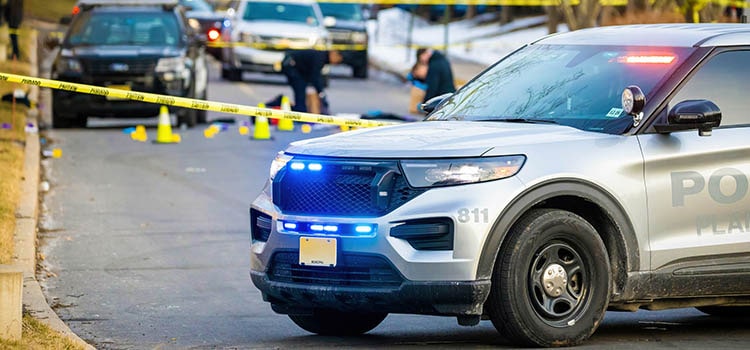In this article
How to become a police officer in New Jersey
Even though there is usually a lot of overlap in the requirements to become a police officer nationwide, it’s important to understand the necessary steps where you live and want to work. If you want to be a police officer in the state of New Jersey, the process is fairly similar to many other states.
Above all, it’s always a good idea to check with the law enforcement agency that you would like to work for to find out what it takes to join their force. Every agency can have different requirements and application procedures. You’ll set yourself up for success if you start by checking with agencies directly.
Becoming a police officer in New Jersey comes with its benefits, too. According to the U.S. Bureau of Labor Statistics (BLS), New Jersey ranks third in the nation for the highest annual mean wages of police and sheriff’s patrol officers by state. In fact, New Jersey’s annual mean wage is over $10,000 more than the annual mean wage of its neighbor, New York.
6 steps to become a police officer in New Jersey
Determine if you’re eligible to be a police officer in New Jersey.

There are several statewide requirements for law enforcement officers in New Jersey, including being a U.S. citizen, at least 21 years of age, proficient in English and more. Individual agencies may have their own eligibility standards that surpass the statewide minimum.
Consider earning a college degree.

Many law enforcement agencies require officers to have some postsecondary education. For example, candidates for the New Jersey State Police must have a degree (or 60 semester college hours) plus two years of work and/or military experience in order to be appointed. Having a college degree could set yourself apart as a particularly competitive candidate. You might consider an area of study such as criminal justice, criminology, social work and more.
Research the job requirements of the agency you want to work for.

Like many law enforcement agencies across the country, individual agencies have their own requirements and application processes. It’s important to always contact agencies directly to learn about what they require for different law enforcement roles.
Take and pass the Law Enforcement Examination (LEE), if applicable.

According to the New Jersey State Association of Chiefs of Police, about half of law enforcement agencies in the state fall under the Civil Service regulations. Applicants at these agencies must take a Civil Service Examination, in this case, the Law Enforcement Examination (LEE), used for nearly all entry-level law enforcement positions. Once you pass the test, you will be put on an eligible employment list for the jurisdictions that you apply for. All other law enforcement agencies that are not under Civil Service regulations have their own hiring processes, which also usually involves taking an exam.
Once hired, complete necessary training.

Many law enforcement agencies, including the state police, send you to a basic training academy after you pass all their initial screen procedures and are hired on. This training period typically lasts around six months, though this can vary from academy to academy.
Some agencies may want you to have already completed a basic training academy before applying. It is possible to attend some of these academies on your own time and money prior to securing a job.
Consider advancing your education to move up the ranks.

It’s common for many law enforcement agencies to require higher-ranking law enforcement officers to possess a certain degree in order to quality for promotion. It may be in your best interest, therefore, to consider getting a degree if you eventually want to move up the chain of command.
For officers that are a part of Civil Services agencies, you must also take one of the separate promotional examinations which are used in the selection process for higher-level positions such as lieutenants, sergeants and captains.
New Jersey police officer qualifications
New Jersey has certain statewide minimum qualifications for most police officers. In general, you must satisfy the following to be appointed to a police department in New Jersey:
- United States citizen
- Can read, write and speak English
- At least 21 years old and younger than 35 (there are some exceptions to the age limit)
- Have not been convicted of a criminal offense
- Are in good health
It is also common for most law enforcement agencies to require that you have at least a high school diploma or equivalent education, such as a GED.
Education requirements
Many law enforcement agencies have required qualifications for police officers that surpass the statewide minimum. Having some postsecondary education is an especially common requirement. To be appointed as a state trooper with the New Jersey State Police, for example, you must have either:
- A bachelor’s degree
- An associate degree or 60 college credits plus two years of work or active-duty military experience
- 30 college credits plus two years of active-duty military experience
If you’re going to get a degree prior to becoming a police officer—or you’re currently an officer that wants to advance your education—you might consider studying a relevant subject such as:
- Criminal justice
- Criminology
- Homeland security
- Emergency management
- Cybersecurity
- Social work
- Public administration
Tyree Cooper, a state trooper in the recruitment unit of the New Jersey State Police, said that getting a degree could be crucial later in your career when you’re up for promotion. Some agencies may require you to have a certain degree to get promoted. Others may use a point-based promotional system which gives you points based on your education level. If you don’t have a degree, those could be critical points that you miss out on.
“I’m seeing a lot of senior guys who got in and they probably didn’t want to go back to school, but they need that point now,” Cooper said. “I tell people now is the best time to do it because you’re not going to want to do it when you’re around 40 years old and want to retire soon. It’s going to be easier to go and get it done now.”
Getting trained and hired
After being screened for the minimum qualifications, most law enforcement agencies then have you take and/or be subject to a series of examinations. These typically include a written test, a medical and psychological examination, a background investigation and a physical fitness test.
Agencies that fall under New Jersey’s Civil Service regulations require you to take the Law Enforcement Examination (LEE). This written exam is designed to measure your basic competencies and readiness for an entry-level law enforcement position.
“Most agencies and most departments other than us go through Civil Service,” Cooper said. “They use the Civil Service Exam to apply to their agencies. When that exam comes out, you can put down who you’d like to apply for.” Cooper said you can apply for multiple positions at multiple agencies as part of the LEE exam.
This isn’t the only route you can take, though. You can put yourself through some basic law enforcement training academies before ever applying for jobs. Some agencies may prefer this, especially smaller ones.
“I’ve seen both. In New Jersey they call it the ‘alternate route’ when you go on your own and then get picked up. So that’s kind of the big difference—if you spend your own money to get that certification, you hope that you get picked up by somebody.”
Putting yourself through the academy does come with some risk. By spending your own money to do so, you’re taking the chance that you’ll get hired by someone eventually.
“It’s becoming a bigger thing now especially once Covid hit. Most local towns that I talk to, they only hire people with that certification,” Cooper said.
New Jersey police officer salary and job outlook
According to the BLS, employment for police and detectives nationwide is expected to grow only 3.3% over the next ten years, slightly slower than the average across all occupations. However, that still translates to about 68,500 openings each year on average over the decade.
State Guides for Prospective Police Officers
Take a look at the steps you’ll need to take to become a police officer in other states:




